Japenese culturl 用英语介绍的日本文化
日本文化的英语作文
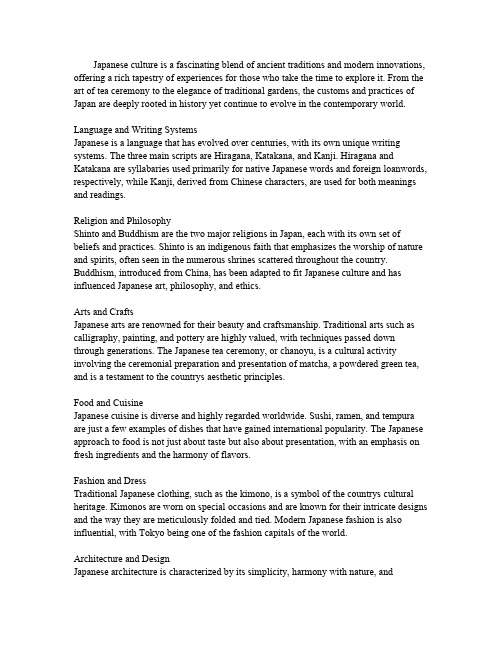
Japanese culture is a fascinating blend of ancient traditions and modern innovations, offering a rich tapestry of experiences for those who take the time to explore it.From the art of tea ceremony to the elegance of traditional gardens,the customs and practices of Japan are deeply rooted in history yet continue to evolve in the contemporary world.Language and Writing SystemsJapanese is a language that has evolved over centuries,with its own unique writing systems.The three main scripts are Hiragana,Katakana,and Kanji.Hiragana and Katakana are syllabaries used primarily for native Japanese words and foreign loanwords, respectively,while Kanji,derived from Chinese characters,are used for both meanings and readings.Religion and PhilosophyShinto and Buddhism are the two major religions in Japan,each with its own set of beliefs and practices.Shinto is an indigenous faith that emphasizes the worship of nature and spirits,often seen in the numerous shrines scattered throughout the country. Buddhism,introduced from China,has been adapted to fit Japanese culture and has influenced Japanese art,philosophy,and ethics.Arts and CraftsJapanese arts are renowned for their beauty and craftsmanship.Traditional arts such as calligraphy,painting,and pottery are highly valued,with techniques passed down through generations.The Japanese tea ceremony,or chanoyu,is a cultural activity involving the ceremonial preparation and presentation of matcha,a powdered green tea, and is a testament to the countrys aesthetic principles.Food and CuisineJapanese cuisine is diverse and highly regarded worldwide.Sushi,ramen,and tempura are just a few examples of dishes that have gained international popularity.The Japanese approach to food is not just about taste but also about presentation,with an emphasis on fresh ingredients and the harmony of flavors.Fashion and DressTraditional Japanese clothing,such as the kimono,is a symbol of the countrys cultural heritage.Kimonos are worn on special occasions and are known for their intricate designs and the way they are meticulously folded and tied.Modern Japanese fashion is also influential,with Tokyo being one of the fashion capitals of the world.Architecture and DesignJapanese architecture is characterized by its simplicity,harmony with nature,andattention to detail.From the minimalist design of a traditional tea house to the sleek lines of modern skyscrapers,Japanese design principles are evident.The concept of wabisabi, which finds beauty in imperfection and transience,is a key aesthetic principle in Japanese design.Festivals and HolidaysJapan is known for its vibrant festivals,or matsuri,which are held throughout the year. These festivals often involve processions,traditional performances,and food stalls, providing a glimpse into the countrys cultural life.National holidays,such as Golden Week and Obon,are also significant events that bring families and communities together.Entertainment and MediaJapanese entertainment is a global phenomenon,with anime,manga,and video games being particularly popular.The countrys film industry is also renowned,with directors like Akira Kurosawa having a significant impact on cinema worldwide.Japanese pop music,or Jpop,is another form of media that has captured the attention of audiences around the globe.In conclusion,Japanese culture is a complex and multifaceted entity that offers a wealth of experiences for those who delve into its depths.From the traditional to the modern,the cultural landscape of Japan is everchanging,yet it remains a testament to the countrys rich history and enduring spirit.。
日本文化英语作文

日本文化英语作文Japan is a country with a rich and unique culture. From traditional tea ceremonies to modern anime, Japaneseculture has something for everyone. 。
One of the most iconic aspects of Japanese culture is its cuisine. Sushi, ramen, and tempura are just a few of the delicious dishes that Japan has to offer. The attention to detail and presentation in Japanese food is truly remarkable.Another fascinating aspect of Japanese culture is its traditional arts, such as ikebana (flower arranging) and origami (paper folding). These art forms require patience and precision, and they have been passed down through generations.Japanese festivals are also a big part of the culture. From the cherry blossom festivals in spring to the lantern festivals in summer, there is always something to celebratein Japan. These festivals are a great way to experience the vibrant and lively atmosphere of Japanese culture.Japanese fashion is another aspect of the culture thatis well-known around the world. From traditional kimono to modern streetwear, Japanese fashion is always evolving and pushing boundaries.Overall, Japanese culture is a fascinating mix of tradition and modernity. Whether you are interested in food, art, festivals, or fashion, there is something in Japanese culture that will capture your interest.。
介绍日本的英语作文
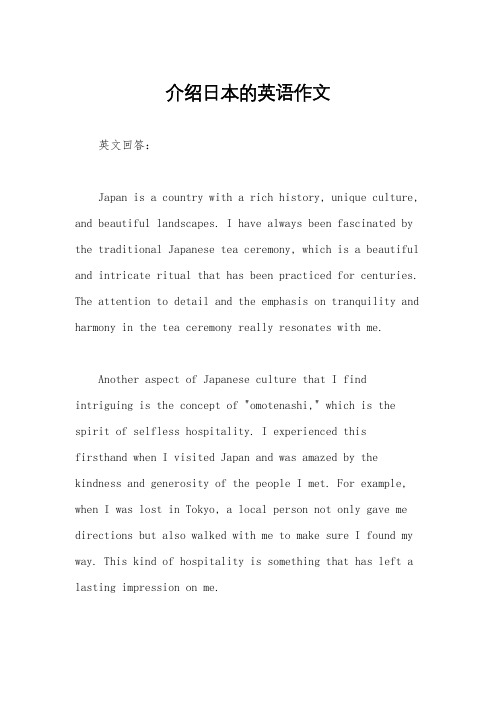
介绍日本的英语作文英文回答:Japan is a country with a rich history, unique culture, and beautiful landscapes. I have always been fascinated by the traditional Japanese tea ceremony, which is a beautiful and intricate ritual that has been practiced for centuries. The attention to detail and the emphasis on tranquility and harmony in the tea ceremony really resonates with me.Another aspect of Japanese culture that I find intriguing is the concept of "omotenashi," which is the spirit of selfless hospitality. I experienced thisfirsthand when I visited Japan and was amazed by the kindness and generosity of the people I met. For example, when I was lost in Tokyo, a local person not only gave me directions but also walked with me to make sure I found my way. This kind of hospitality is something that has left a lasting impression on me.In terms of language, I have always been drawn to the beauty of the Japanese language and its unique writing system. I have been learning Japanese for a while now, andI find it incredibly rewarding to be able to communicate ina different language. It has opened up a whole new worldfor me and allowed me to connect with people from a different culture in a meaningful way.Overall, Japan has left a deep impression on me, and I am constantly inspired by its culture, traditions, and people.中文回答:日本是一个拥有丰富历史、独特文化和美丽风景的国家。
英文作文200字介绍日本
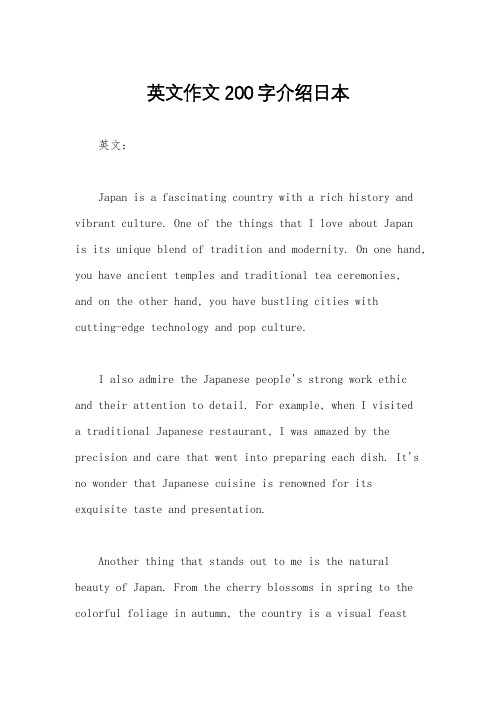
英文作文200字介绍日本英文:Japan is a fascinating country with a rich history and vibrant culture. One of the things that I love about Japanis its unique blend of tradition and modernity. On one hand, you have ancient temples and traditional tea ceremonies,and on the other hand, you have bustling cities withcutting-edge technology and pop culture.I also admire the Japanese people's strong work ethic and their attention to detail. For example, when I visiteda traditional Japanese restaurant, I was amazed by the precision and care that went into preparing each dish. It's no wonder that Japanese cuisine is renowned for itsexquisite taste and presentation.Another thing that stands out to me is the natural beauty of Japan. From the cherry blossoms in spring to the colorful foliage in autumn, the country is a visual feastfor the eyes. I also had the chance to visit Mount Fuji,and the experience was truly awe-inspiring.中文:日本是一个充满魅力的国家,拥有丰富的历史和充满活力的文化。
描述日本风俗文化英语作文

Title: Embracing the Unique Customs andCulture of JapanJapan, an island nation steeped in history and tradition, presents a fascinating tapestry of customs and culture. From the elegant precision of its tea ceremony to the vibrant energy of its festivals, Japan offers a rich palette of experiences that are both enchanting and enlightening.The heart of Japanese culture lies in its respect for tradition and reverence for nature. This is reflected in the meticulous attention to detail in all aspects of daily life, whether it's the meticulous care taken in preparing a meal or the precision with which tea is poured during the tea ceremony. The tea ceremony, known as "sado," is notjust about drinking tea; it's an elaborate ritual that involves the harmonious interaction of host and guest, the appreciation of the beauty of nature, and the pursuit of inner peace.Another hallmark of Japanese culture is its emphasis on community and collective harmony. This is evident in the way Japanese people greet each other with bows and politephrases, demonstrating respect and consideration for others. The concept of "wa," which translates to harmony or unity,is ingrained in Japanese society and is reflected invarious aspects of life, from social interactions to theway businesses are conducted.Festivals and celebrations are an integral part of Japanese culture, with each season marked by special events and traditions. The cherry blossom viewing, known as "sakura-viewing," is a national obsession, with people flocking to parks and temples to admire the delicate beauty of the flowers. The autumn moon viewing, on the other hand, is a time for family reunions and the appreciation of thefull moon against the backdrop of autumn foliage.The visual arts of Japan are also a testament to itsrich cultural heritage. From the delicate brushstrokes of traditional Japanese painting to the intricate carvings of lacquerware, Japanese artists have perfected the art of combining beauty and functionality. The art of origami, the folding of paper into intricate shapes, is another exampleof Japanese creativity and craftsmanship.In conclusion, Japan's customs and culture are atapestry of tradition, harmony, and natural beauty. Fromthe precision of its tea ceremony to the vibrantcelebrations of its festivals, Japan offers a unique and enchanting experience that leaves a lasting impression on those who visit. Embracing these customs and traditions,one can truly appreciate the depth and richness of Japanese culture.**拥抱日本独特的风俗文化**日本,这个岛屿国家拥有丰富的历史和传统,展现了一幅迷人且多姿多彩的风俗文化画卷。
日本文化英语作文
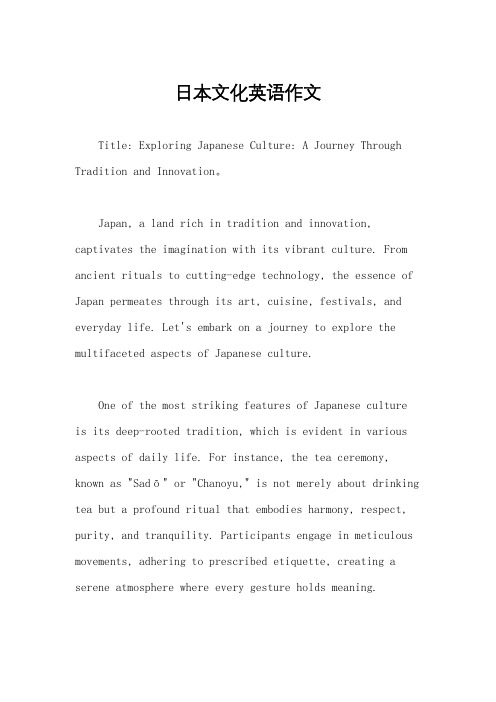
日本文化英语作文Title: Exploring Japanese Culture: A Journey Through Tradition and Innovation。
Japan, a land rich in tradition and innovation, captivates the imagination with its vibrant culture. From ancient rituals to cutting-edge technology, the essence of Japan permeates through its art, cuisine, festivals, and everyday life. Let's embark on a journey to explore the multifaceted aspects of Japanese culture.One of the most striking features of Japanese cultureis its deep-rooted tradition, which is evident in various aspects of daily life. For instance, the tea ceremony, known as "Sadō" or "Chanoyu," is not merely about drinking tea but a profound ritual that embodies harmony, respect, purity, and tranquility. Participants engage in meticulous movements, adhering to prescribed etiquette, creating a serene atmosphere where every gesture holds meaning.Another aspect of Japanese tradition is the art of Ikebana, or flower arrangement. Originating from the Buddhist practice of offering flowers to the spirits, Ikebana evolved into a sophisticated art form characterized by minimalist aesthetics and a deep appreciation for nature. Each arrangement is meticulously crafted to evoke harmony and balance, reflecting the seasonal beauty of Japan's flora.Moreover, traditional Japanese architecture, with its emphasis on simplicity, natural materials, and harmony with the environment, showcases the timeless elegance of Japanese design. From the serene temples of Kyoto to the intricate wooden machiya houses of old Kyoto, everystructure tells a story of craftsmanship and reverence for the surrounding landscape.While tradition forms the bedrock of Japanese culture, Japan is also a hub of innovation and modernity. Thecountry's technological prowess is globally renowned, with groundbreaking advancements in robotics, electronics, and transportation. Tokyo, a bustling metropolis, pulsates withenergy and innovation, reflecting Japan's status as a leader in technology and design.The concept of "Wa" or harmony permeates Japanese society, manifesting in various forms, including the efficient and orderly public transportation system, the meticulous craftsmanship of Japanese products, and the seamless blend of tradition and modernity in everyday life. Whether it's the sleek design of a Shinkansen bullet train or the precision engineering of a Japanese kitchen knife, the pursuit of harmony is evident in every aspect of Japanese innovation.Japanese pop culture, often referred to as "Cool Japan," has also garnered global attention, influencing trends in fashion, entertainment, and cuisine. From the colorful world of anime and manga to the catchy tunes of J-pop music, Japanese pop culture reflects the dynamic and eclectic nature of contemporary Japan.Cuisine is another integral aspect of Japanese culture, renowned for its exquisite flavors, meticulous preparation,and artistic presentation. From delicate sushi and sashimi to hearty bowls of ramen and savory yakitori skewers, Japanese cuisine offers a culinary journey that tantalizes the taste buds and nourishes the soul.Furthermore, traditional festivals, known as "Matsuri," showcase Japan's vibrant cultural heritage and community spirit. From the dazzling floats of the Gion Matsuri in Kyoto to the breathtaking fireworks of the Sumida River Fireworks Festival in Tokyo, these celebrations bring people together to honor tradition, celebrate the seasons, and create lasting memories.In conclusion, Japanese culture is a tapestry woven with threads of tradition and innovation, creating a unique blend of ancient wisdom and modern dynamism. From the serene rituals of the tea ceremony to the bustling streets of Tokyo, Japan's rich cultural heritage continues to inspire and captivate people around the world. As we delve deeper into the heart of Japanese culture, we discover not only its timeless traditions but also its boundless creativity and spirit of innovation.。
日本的文化英语作文
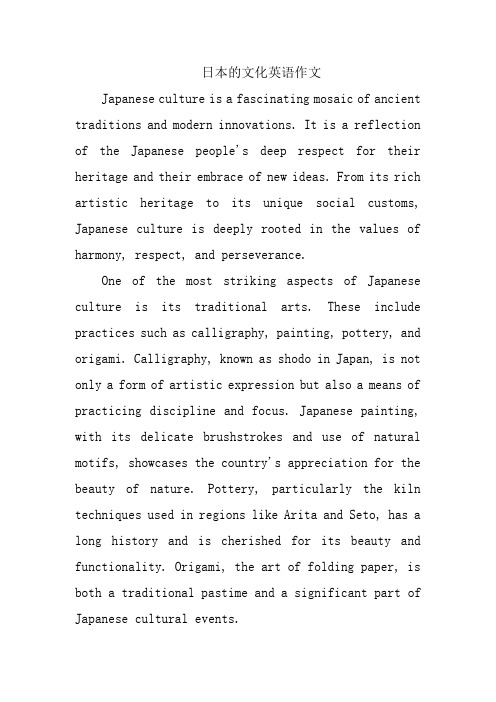
日本的文化英语作文Japanese culture is a fascinating mosaic of ancient traditions and modern innovations. It is a reflection of the Japanese people's deep respect for their heritage and their embrace of new ideas. From its rich artistic heritage to its unique social customs, Japanese culture is deeply rooted in the values of harmony, respect, and perseverance.One of the most striking aspects of Japanese culture is its traditional arts. These include practices such as calligraphy, painting, pottery, and origami. Calligraphy, known as shodo in Japan, is not only a form of artistic expression but also a means of practicing discipline and focus. Japanese painting, with its delicate brushstrokes and use of natural motifs, showcases the country's appreciation for the beauty of nature. Pottery, particularly the kiln techniques used in regions like Arita and Seto, has a long history and is cherished for its beauty and functionality. Origami, the art of folding paper, is both a traditional pastime and a significant part of Japanese cultural events.Japanese cuisine, known as washoku, is world-renowned for its delicate flavors, intricate presentation, and emphasis on seasonal ingredients. Dishes such as sushi, tempura, and ramen have gained global popularity, reflecting the influence of Japanese cuisine on world food cultures. The art of tea ceremony, orchanoyu, is another important aspect of Japanese culture, symbolizing harmony, respect, and tranquility.Social customs in Japan are characterized by a strong sense of etiquette and respect. The concept of omotenashi, or hospitality, is deeply ingrained in Japanese society. This is evident in the attention to detail in service industries, the importance of gift-giving, and the practice of bowing as a form of greeting. The Japanese people's respect for elders and their commitment to maintaining harmony in social interactions are also notable aspects of Japanese culture.In recent years, Japanese culture has also influenced global trends in fashion, animation, and technology. Japanese street fashion, with its bold andinnovative styles, has captured the imagination of fashion enthusiasts worldwide. Anime and manga, Japanese forms of graphic storytelling, have become global phenomena, introducing Japanese cultural elements to audiences far and wide.In conclusion, Japanese culture is a unique blend of tradition and modernity. Its rich heritage and innovative practices continue to inspire and captivate people around the world. The Japanese people's dedication to preserving their cultural traditions while embracing new ideas is a testament to the dynamic and fascinating nature of Japanese culture.中文翻译:日本文化是一幅由古老传统和现代创新构成的迷人马赛克。
日本文化介绍(全英文版)
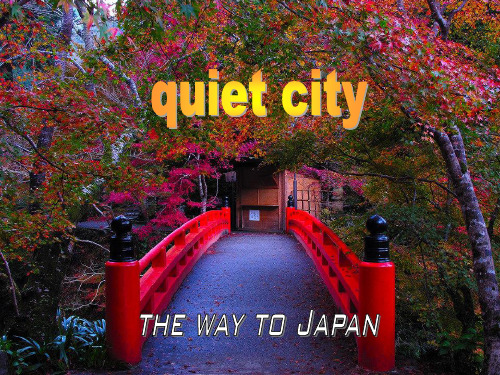
Composition
• The main islands, sometimes called the "Home Islands", are (from north to south) Hokkaidō, Honshū (the "mainland"), Shikoku and Kyūshū. There are also about 3,000 smaller islands, including Okinawa, and islets, some inhabited and others uninhabited. In total, as of 2006, Japan's territory is 377,923.1 km² , of which 374,834 km²is land and 3,091 km²water. This makes Japan's total area slightly smaller than the U.S. state of Montana, slightly bigger than the Brazilian state of Mato Grosso do Sul. Japan is bigger than Germany, Malaysia, New Zealand and the U.K., and is 1.7 times the (和服)
The kimono is a Japanese traditional garment worn by women, men and children. The word "kimono", which literally means a "thing to wear" (ki "wear" and mono "thing"), has come to denote these full-length robes. The standard plural of the word kimono in English is kimonos,[but the unmarked Japanese plural kimono is also sometimes used. Kimono are T-shaped, straight-lined robes worn so that the hem falls to the ankle, with attached collars and long, wide sleeves. Kimono are wrapped around the body, always with the left side over the right (except when dressing the dead for burial),[and secured by a sash called an obi, which is tied at the back. Kimono are generally worn with traditional footwear and split-toe socksToday, kimono are most often worn by women, and on special occasions. Traditionally, unmarried women wore a style of kimono called furisodewith almost floor-length sleeves, on special occasions. A few older women and even fewer men still wear the kimono on a daily basis. Men wear the kimono most often at weddings, tea ceremonies, and other very special or very formal occasions. Professional sumo wrestlers are often seen in the kimono because they are required to wear traditional Japanese dress whenever appearing in public
英文作文日本介绍
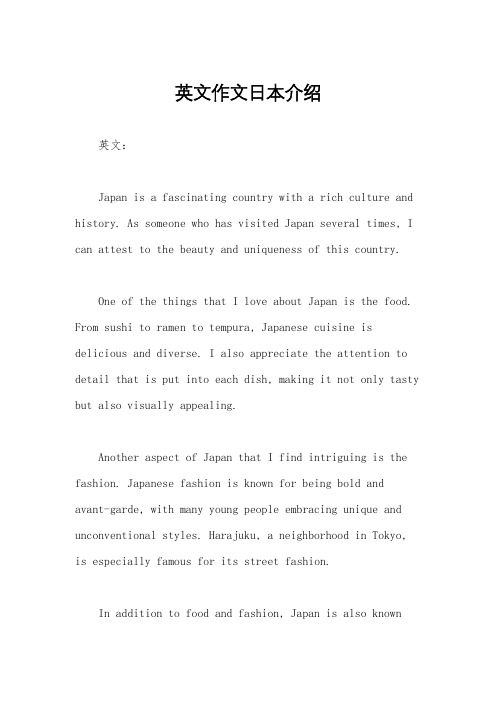
英文作文日本介绍英文:Japan is a fascinating country with a rich culture and history. As someone who has visited Japan several times, I can attest to the beauty and uniqueness of this country.One of the things that I love about Japan is the food. From sushi to ramen to tempura, Japanese cuisine is delicious and diverse. I also appreciate the attention to detail that is put into each dish, making it not only tasty but also visually appealing.Another aspect of Japan that I find intriguing is the fashion. Japanese fashion is known for being bold andavant-garde, with many young people embracing unique and unconventional styles. Harajuku, a neighborhood in Tokyo, is especially famous for its street fashion.In addition to food and fashion, Japan is also knownfor its technology. Companies like Sony and Nintendo have made significant contributions to the world of electronics and gaming. During my visits to Japan, I have been impressed by the efficiency and innovation of their transportation systems, such as the bullet train.Overall, Japan is a country that offers a fascinating blend of tradition and modernity. Its culture, food, fashion, and technology make it a truly unique and captivating destination.中文:日本是一个拥有丰富文化和历史的迷人国家。
描述日本风俗文化英语作文
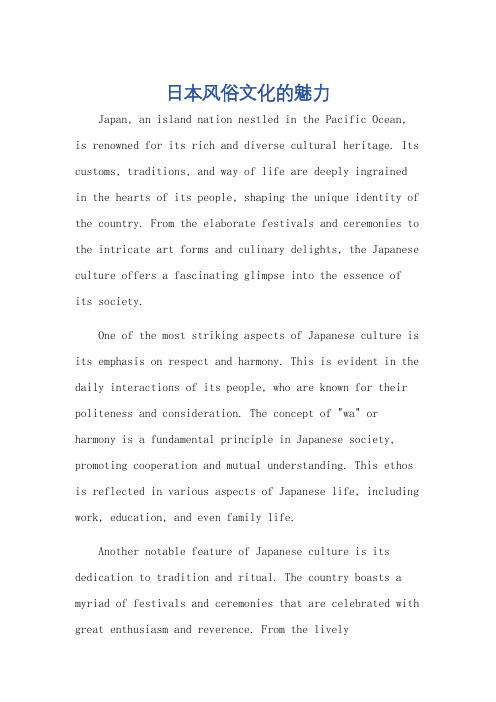
日本风俗文化的魅力Japan, an island nation nestled in the Pacific Ocean,is renowned for its rich and diverse cultural heritage. Its customs, traditions, and way of life are deeply ingrainedin the hearts of its people, shaping the unique identity of the country. From the elaborate festivals and ceremonies to the intricate art forms and culinary delights, the Japanese culture offers a fascinating glimpse into the essence ofits society.One of the most striking aspects of Japanese culture is its emphasis on respect and harmony. This is evident in the daily interactions of its people, who are known for their politeness and consideration. The concept of "wa" or harmony is a fundamental principle in Japanese society, promoting cooperation and mutual understanding. This ethos is reflected in various aspects of Japanese life, including work, education, and even family life.Another notable feature of Japanese culture is its dedication to tradition and ritual. The country boasts a myriad of festivals and ceremonies that are celebrated with great enthusiasm and reverence. From the livelycelebrations of the New Year to the solemn rituals of Shinto and Buddhism, these events provide a window into the deep-rooted beliefs and values of the Japanese people.The Japanese arts are also renowned worldwide for their uniqueness and elegance. From the graceful movements of traditional dance to the intricate details of pottery and painting, these art forms reflect the aestheticsensibilities and creative spirit of the Japanese. The tea ceremony, in particular, is a testament to the Japanese appreciation for simplicity and natural beauty.Moreover, Japanese cuisine is a testament to the country's rich culinary heritage. The meticulous preparation of dishes, the emphasis on seasonality and freshness, and the harmonious blending of flavors all contribute to the unique charm of Japanese food. From sushi and ramen to tempura and izakaya, these culinary delights are not only a pleasure for the taste buds but also a journey through the rich history and culture of Japan.Furthermore, the Japanese way of dressing, known as "kimono," is another emblem of the country's cultural identity. The intricate patterns and vibrant colors of thekimono reflect the artistic sensibilities of the Japanese, while the act of dressing in a kimono itself is aritualized process that强调了尊重和谦逊的文化价值。
关于日本文化的小作文英语
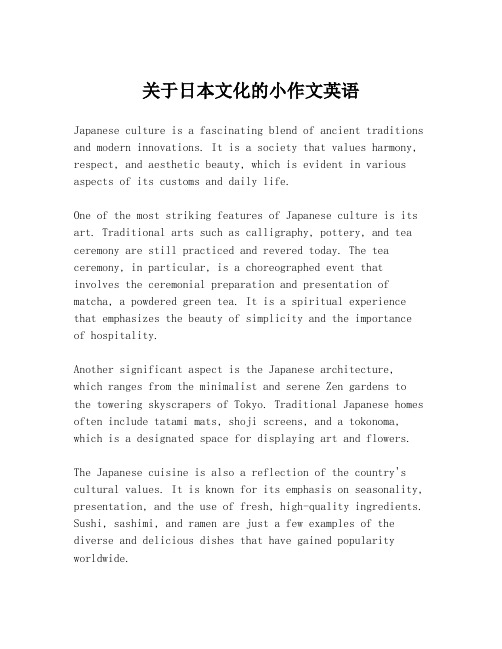
关于日本文化的小作文英语Japanese culture is a fascinating blend of ancient traditions and modern innovations. It is a society that values harmony, respect, and aesthetic beauty, which is evident in various aspects of its customs and daily life.One of the most striking features of Japanese culture is its art. Traditional arts such as calligraphy, pottery, and tea ceremony are still practiced and revered today. The tea ceremony, in particular, is a choreographed event that involves the ceremonial preparation and presentation of matcha, a powdered green tea. It is a spiritual experience that emphasizes the beauty of simplicity and the importance of hospitality.Another significant aspect is the Japanese architecture, which ranges from the minimalist and serene Zen gardens to the towering skyscrapers of Tokyo. Traditional Japanese homes often include tatami mats, shoji screens, and a tokonoma, which is a designated space for displaying art and flowers.The Japanese cuisine is also a reflection of the country's cultural values. It is known for its emphasis on seasonality, presentation, and the use of fresh, high-quality ingredients. Sushi, sashimi, and ramen are just a few examples of the diverse and delicious dishes that have gained popularity worldwide.In terms of social norms, the Japanese place a high value on politeness and social hierarchy. Bowing is a common way to greet, show respect, or apologize. The language itself has different levels of politeness and formality, which arechosen based on the speaker's relationship to the listener.Contemporary Japan is also known for its technological advancements and pop culture. From anime and manga to video games and robotics, Japan has a significant influence onglobal entertainment and innovation.In conclusion, Japanese culture is a rich tapestry of history, tradition, and modernity. It is a culture that continues to evolve while maintaining a deep respect for its roots.Whether you are interested in its traditional arts, culinary delights, or technological achievements, Japan offers aunique and enriching cultural experience.。
介绍日本 英语作文

介绍日本英语作文Japan is a country located in East Asia, known for its rich history, unique culture, and advanced technology. The country is made up of four main islands, with a population of over 126 million people. 。
The Japanese culture is deeply rooted in tradition and customs, with a strong emphasis on respect, honor, and discipline. The traditional Japanese attire, such as the kimono, and the practice of tea ceremonies and flower arranging, are all integral parts of the country's cultural heritage.In addition to its traditional culture, Japan is also known for its modern advancements in technology and innovation. The country is home to some of the world's leading technology companies and is a pioneer in robotics, automotive manufacturing, and electronic gadgets.Japanese cuisine is also highly regarded worldwide,with dishes such as sushi, ramen, and tempura being popular choices. The emphasis on fresh, seasonal ingredients and meticulous preparation makes Japanese food a delight for the senses.One of Japan's most famous attractions is Mount Fuji, an iconic symbol of the country and the highest mountain in Japan. The country is also known for its beautiful cherry blossoms, which attract millions of tourists every spring.Overall, Japan is a fascinating and diverse countrythat seamlessly blends its rich traditions with cutting-edge technology and modernity. Whether it's exploring ancient temples and shrines or experiencing the hustle and bustle of Tokyo, Japan has something to offer for everyone.。
描写日本的英语作文

描写日本的英语作文Japan, a country where tradition meets modernity, is a fascinating place with a rich cultural heritage and a vibrant contemporary life. Here's a composition about Japan:Japan: A Melting Pot of Tradition and ModernityJapan, an island nation in the Pacific Ocean, is known forits unique blend of ancient traditions and cutting-edge technology. Stepping into Japan is like entering a world where the past and the future coexist harmoniously.The Land of the Rising SunJapan's natural beauty is as diverse as its culture. From the snow-capped peaks of Mount Fuji, a symbol of Japan's enduring spirit, to the serene cherry blossoms that bloom in spring, the country offers a feast for the eyes. The Japanese islands are dotted with historic temples and shrines, each telling a story of the country's rich history and religious beliefs.Cultural TraditionsJapanese culture is deeply rooted in respect and tradition. The tea ceremony, a ritual that embodies the principles of harmony, respect, purity, and tranquility, is a testament tothe country's appreciation for the finer things in life. The art of flower arrangement, known as Ikebana, is another example of Japan's pursuit of beauty and balance.CuisineJapanese cuisine is renowned for its emphasis on fresh, seasonal ingredients and presentation. Sushi, a staple in Japanese dining, is a culinary delight that has gained popularity worldwide. Ramen, another popular dish, is a comforting bowl of noodles served in a rich, flavorful broth.Technology and InnovationJapan is a global leader in technology and innovation. From the bullet trains, known as Shinkansen, that zip across the country at incredible speeds, to the advanced robotics industry, Japan is always at the forefront of technological advancements.Education and Work EthicThe Japanese education system is highly respected, with a strong emphasis on discipline and hard work. This work ethic is reflected in the country's economic success and the high standards of its products.Tourism and HospitalityJapan is a popular destination for tourists, who are drawn by its rich cultural experiences, beautiful landscapes, and warmhospitality. The Japanese are known for their politeness and attention to detail, making visitors feel welcome and well cared for.ConclusionIn conclusion, Japan is a country that offers a unique experience to its visitors. It is a place where one can appreciate the beauty of nature, the depth of its culture, the innovation of its technology, and the warmth of its people. Whether you are exploring ancient temples, enjoying a traditional tea ceremony, or marveling at the latest technological marvels, Japan is a country that never fails to amaze and inspire.This composition provides an overview of Japan's cultural, natural, and technological aspects, offering a glimpse into what makes this country so special.。
介绍日本国家英语作文80词
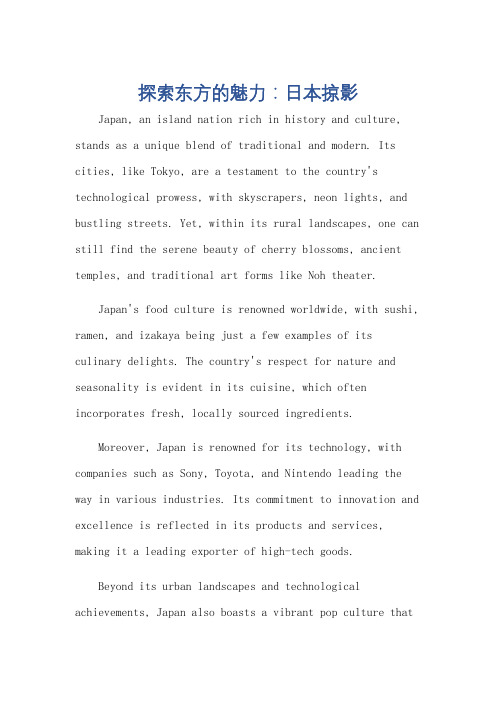
探索东方的魅力:日本掠影Japan, an island nation rich in history and culture, stands as a unique blend of traditional and modern. Its cities, like Tokyo, are a testament to the country's technological prowess, with skyscrapers, neon lights, and bustling streets. Yet, within its rural landscapes, one can still find the serene beauty of cherry blossoms, ancient temples, and traditional art forms like Noh theater.Japan's food culture is renowned worldwide, with sushi, ramen, and izakaya being just a few examples of itsculinary delights. The country's respect for nature and seasonality is evident in its cuisine, which often incorporates fresh, locally sourced ingredients.Moreover, Japan is renowned for its technology, with companies such as Sony, Toyota, and Nintendo leading the way in various industries. Its commitment to innovation and excellence is reflected in its products and services, making it a leading exporter of high-tech goods.Beyond its urban landscapes and technological achievements, Japan also boasts a vibrant pop culture thathas captured the hearts of many. Anime, manga, and cosplay are just a few examples of the country's creative output, which has gained a global fanbase.In conclusion, Japan is a country that offers a unique blend of history, culture, technology, and natural beauty. Its commitment to innovation and respect for tradition makes it a captivating destination for travelers and enthusiasts alike.**探索东方的魅力:日本掠影**日本,这个充满历史和文化的岛国,以其传统与现代的完美融合而独树一帜。
日本生活文化介绍英文作文
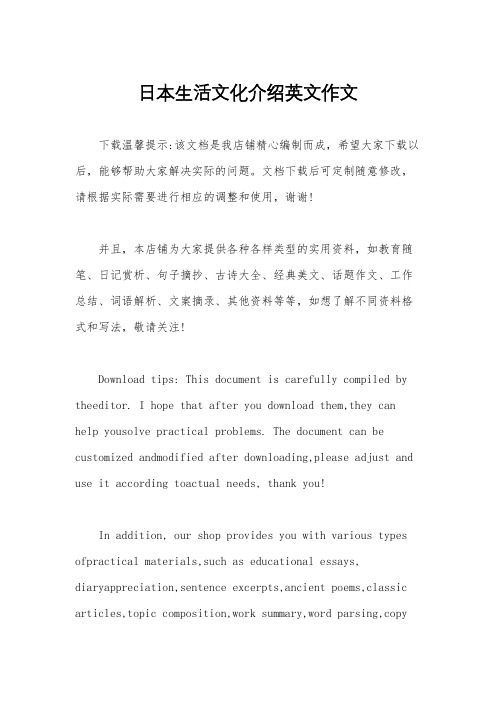
日本生活文化介绍英文作文下载温馨提示:该文档是我店铺精心编制而成,希望大家下载以后,能够帮助大家解决实际的问题。
文档下载后可定制随意修改,请根据实际需要进行相应的调整和使用,谢谢!并且,本店铺为大家提供各种各样类型的实用资料,如教育随笔、日记赏析、句子摘抄、古诗大全、经典美文、话题作文、工作总结、词语解析、文案摘录、其他资料等等,如想了解不同资料格式和写法,敬请关注!Download tips: This document is carefully compiled by theeditor. I hope that after you download them,they can help yousolve practical problems. The document can be customized andmodified after downloading,please adjust and use it according toactual needs, thank you!In addition, our shop provides you with various types ofpractical materials,such as educational essays, diaryappreciation,sentence excerpts,ancient poems,classic articles,topic composition,work summary,word parsing,copyexcerpts,other materials and so on,want to know different data formats andwriting methods,please pay attention!Japan is a country with a rich and diverse culturallife. From traditional tea ceremonies to modern pop culture, there is something for everyone in Japan.One of the most well-known aspects of Japanese cultureis its cuisine. Japanese food is not only delicious, butalso beautiful in its presentation. From sushi to ramen, there is a wide variety of dishes to try. And let's not forget about the famous Japanese tea ceremony, a ritualthat has been practiced for centuries.In addition to food, Japan is also famous for its traditional arts such as ikebana (flower arranging) and origami (paper folding). These art forms require precision and patience, and are a reflection of the Japanese value of simplicity and elegance.When it comes to fashion, Japan is at the forefront of trends. The Harajuku district in Tokyo is known for itsstreet fashion, where young people express themselves through their clothing and accessories. On the other hand, the kimono, a traditional Japanese garment, is still wornon special occasions and is a symbol of Japanese cultural identity.Japanese festivals are another important part of lifein Japan. From the cherry blossom festival to the lantern festival, these events bring people together to celebrate and enjoy traditional performances, food, and drinks.Finally, Japan is also known for its modern pop culture, including anime, manga, and video games. These forms of entertainment have a global following and have had a significant impact on popular culture around the world.In conclusion, Japan's cultural life is diverse and vibrant, blending traditional customs with modern trends. Whether it's food, art, fashion, or entertainment, there is something for everyone to enjoy in Japan.。
关于日本文化的小作文英语

关于日本文化的小作文英语Japanese culture is a fascinating blend of ancient traditions and modern innovations. It is a society that values harmony, respect, and aesthetic beauty, which is evident in various aspects of its customs and daily life.One of the most striking features of Japanese culture is its art. Traditional arts such as calligraphy, pottery, and tea ceremony are still practiced and revered today. The tea ceremony, in particular, is a choreographed event that involves the ceremonial preparation and presentation of matcha, a powdered green tea. It is a spiritual experience that emphasizes the beauty of simplicity and the importance of hospitality.Another significant aspect is the Japanese architecture, which ranges from the minimalist and serene Zen gardens to the towering skyscrapers of Tokyo. Traditional Japanese homes often include tatami mats, shoji screens, and a tokonoma, which is a designated space for displaying art and flowers.The Japanese cuisine is also a reflection of the country's cultural values. It is known for its emphasis on seasonality, presentation, and the use of fresh, high-quality ingredients. Sushi, sashimi, and ramen are just a few examples of the diverse and delicious dishes that have gained popularity worldwide.In terms of social norms, the Japanese place a high value on politeness and social hierarchy. Bowing is a common way to greet, show respect, or apologize. The language itself has different levels of politeness and formality, which arechosen based on the speaker's relationship to the listener.Contemporary Japan is also known for its technological advancements and pop culture. From anime and manga to video games and robotics, Japan has a significant influence onglobal entertainment and innovation.In conclusion, Japanese culture is a rich tapestry of history, tradition, and modernity. It is a culture that continues to evolve while maintaining a deep respect for its roots.Whether you are interested in its traditional arts, culinary delights, or technological achievements, Japan offers aunique and enriching cultural experience.。
日本生活文化介绍英文作文
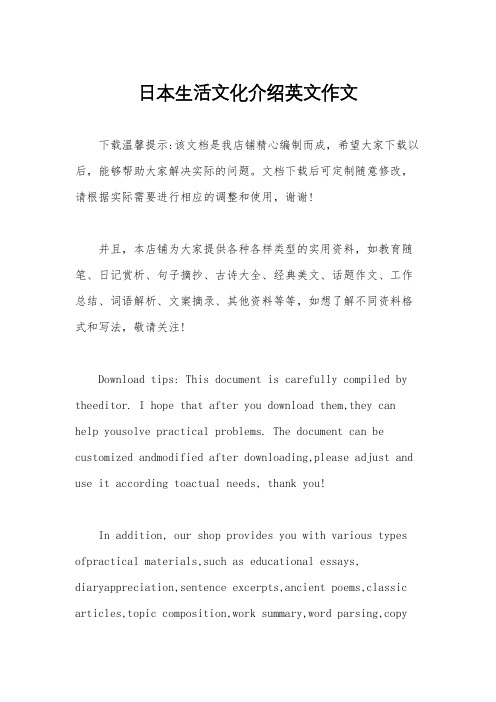
日本生活文化介绍英文作文下载温馨提示:该文档是我店铺精心编制而成,希望大家下载以后,能够帮助大家解决实际的问题。
文档下载后可定制随意修改,请根据实际需要进行相应的调整和使用,谢谢!并且,本店铺为大家提供各种各样类型的实用资料,如教育随笔、日记赏析、句子摘抄、古诗大全、经典美文、话题作文、工作总结、词语解析、文案摘录、其他资料等等,如想了解不同资料格式和写法,敬请关注!Download tips: This document is carefully compiled by theeditor. I hope that after you download them,they can help yousolve practical problems. The document can be customized andmodified after downloading,please adjust and use it according toactual needs, thank you!In addition, our shop provides you with various types ofpractical materials,such as educational essays, diaryappreciation,sentence excerpts,ancient poems,classic articles,topic composition,work summary,word parsing,copyexcerpts,other materials and so on,want to know different data formats andwriting methods,please pay attention!Japan is a country with a rich and diverse cultural heritage. From traditional tea ceremonies to the latest technological innovations, Japanese life is a fascinating blend of old and new.One of the most iconic aspects of Japanese culture is its cuisine. From sushi and sashimi to ramen and tempura, Japanese food is loved and enjoyed all over the world. The emphasis on fresh, seasonal ingredients and beautiful presentation makes dining in Japan a unique and delightful experience.The Japanese are also known for their strong sense of community and respect for tradition. This can be seen in the way they celebrate festivals and holidays, such as the cherry blossom viewing in spring and the Obon festival in summer. These events bring people together to honor their cultural heritage and create lasting memories with friends and family.Another important aspect of Japanese life is theconcept of "omotenashi," or hospitality. Whether you're staying in a traditional ryokan or visiting a friend's home, you'll be treated with the utmost care and respect. This emphasis on kindness and consideration for others is deeply ingrained in Japanese society.In addition to these traditional cultural practices, Japan is also a global leader in technology and innovation. From bullet trains to cutting-edge robotics, the country is constantly pushing the boundaries of what is possible. This blend of tradition and modernity is what makes Japan such a unique and dynamic place to live.Overall, Japanese life and culture are a fascinatingmix of tradition, innovation, and community. Whether you're exploring the bustling streets of Tokyo or the serene countryside, you'll find a deep sense of history and a vibrant spirit of progress that makes Japan a truly special place.。
- 1、下载文档前请自行甄别文档内容的完整性,平台不提供额外的编辑、内容补充、找答案等附加服务。
- 2、"仅部分预览"的文档,不可在线预览部分如存在完整性等问题,可反馈申请退款(可完整预览的文档不适用该条件!)。
- 3、如文档侵犯您的权益,请联系客服反馈,我们会尽快为您处理(人工客服工作时间:9:00-18:30)。
THANKS!
dessert
kimono 和服
Women's kimonos
Kimono is Japan's national costume, the highly traditional Japanese culture for hundreds of years and the Japanese life closely linked. Even today, whenever there's a holiday or a wedding, funeral, graduation ceremonies and celebrations such as a grand occasion, the Japanese kimono is still the first choice. 和服是日本的民族服装, 极富日本传统文化特色,千百年 来与日本人的生活息息相连。直 到现在,逢年过节或在婚礼、葬 礼、毕业典礼及庆祝会等隆重场 合上,和服仍是日本人的首选。
JAPANESE CULTURE
•Food • Cloth • Hot spring • Cherry
blossom
Food
Japanese cuisine 日式美食
shrimp tempura炸虾 sushi寿司 vegetable tempura(什锦蔬菜天妇罗) sake sashimi日本生鱼片 Rice and vegetable roll 饭团 Japanese ramen日式拉面
Hot spring
A hot spring bath proves to be an efficient therapy(疗法) for one to keep fit as well as a miraculous(超 自然的,奇迹般的) way of skin care.
picture
cherry blossom
Japan's cherry blossoms every year from south to north sequence flowering, so the Japanese have a word called cherry front
每年日本的樱花会从南向北 次第开花,所以日本有个词 叫樱花前线
